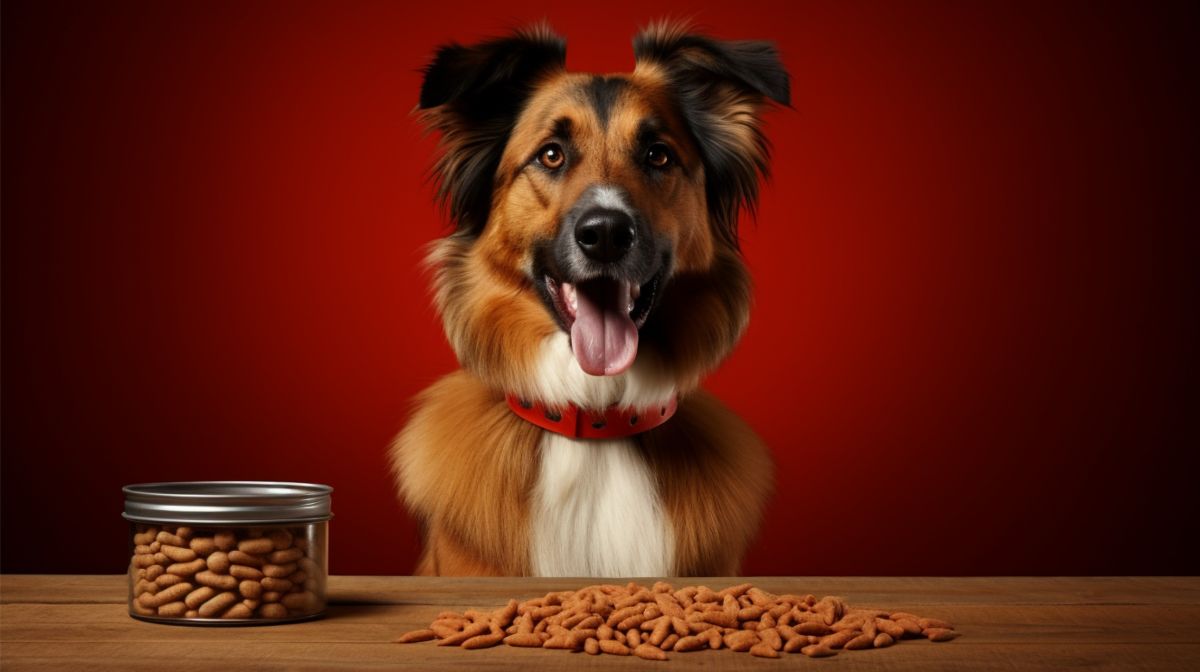Have you ever wondered to have question on do dogs get tired of the same food? This question tickles the curiosity of many dog owners around the world. It is a very common and natural phenomenon.
Dogs are like humans. They have preferences and desires and their relationship with food is no exception. Whether it is the same kibble day in and day out or a consistent homemade meal, it is natural to ponder if our furry friends crave variety.
Understanding their behavior towards food can lead to better care and satisfaction for our beloved companions. So, let’s delve into this intriguing topic and uncover whether dogs truly tire of the same food.
Understanding Canine Taste and Preference
Dogs have taste buds like humans, but they prefer different flavors. They enjoy foods with strong smells, like meat. Dogs also like foods with a mix of textures such as crunchy and soft. However, their preferences can vary based on breed and individual taste.
Understanding what flavors dogs like helps in making better dog foods. Many dog food companies conduct taste tests with real dogs to see which flavors they enjoy the most. These tests help to create foods that dogs will love to eat. It is important to provide a balanced diet for dogs including proteins, fats, vitamins and minerals.
Owners should pay attention to their dog’s reactions to different foods to ensure that they are happy and healthy. Overall, understanding canine taste and preference helps in making nutritious and tasty dog foods that dogs will enjoy eating.
Understanding Dog Food Rotations
Dog food rotation means changing the type or brand of food your dog eats regularly. This helps to prevent nutritional imbalances and reduces the risk of developing food allergies. Rotating dog food involves gradually introducing new foods in the time of decreasing the old ones to avoid digestive upset.
It is like giving your dog different flavors and ingredients to keep their meals interesting. Rotating food ensures that your dog gets a variety of nutrients and prevents them from getting bored with their meals. It is important to transition slowly between foods to avoid upsetting your dog’s stomach.
Pay attention to your dog’s reactions and adjust the rotation if needed. Overall, rotating dog food can contribute to your pet’s overall health and well-being by providing a balanced diet and keeping mealtime enjoyable.
Factors Influencing Food Preference in Dogs
Understanding what influences a dog’s food preference is essential for ensuring their health and well-being. Here are some key factors to consider:
Taste and Texture
Dogs have preferences for certain tastes and textures. Just as some people prefer crunchy foods while others prefer soft ones. Dogs can have preferences for crunchy kibbles over wet food or vice versa. Transitioning gradually between different textures can help to determine what your dog prefers.
Smell
Dogs have a highly developed sense of smell which plays a significant role in their food preferences. They are attracted to aromas that are appealing to them which can vary depending on the individual dog. Introducing new foods with enticing smells can help to pique their interest.
Previous Experiences
Past experiences with food can shape a dog’s preferences. If a dog has had positive experiences with certain types of food, they can be more inclined to choose similar options in the future. Conversely, negative experiences can lead to aversions.
Nutritional Needs
Dogs have specific nutritional requirements based on factors such as age, breed, and size and health status. They can naturally gravitate towards foods that fulfill these needs. It is essential to provide a balanced diet that meets their nutritional requirements while also considering their taste preferences.
Social Influence
Dogs are observant animals and can be influenced by the eating habits of other dogs in their environment. They can show a preference for foods that their canine companions enjoy or that they see their owners feeding them.
Variety and Novelty
Like humans, dogs can get bored with eating the same food every day. Introducing variety and novel foods can stimulate their interest and prevent them from becoming picky eaters. However, it is important to introduce new foods gradually to avoid digestive upset.
How to Address Food Boredom in Dogs
Food boredom in dogs can lead to various behavioral issues and health problems if left unattended. Fortunately, there are several simple strategies to keep your furry friend engaged and satisfied.
Firstly, diversify their diet. Introduce new flavors and textures gradually to prevent digestive upset. Transitioning from kibble to raw food or incorporating homemade treats can add excitement to mealtime.
Secondly, incorporate puzzle feeders or interactive toys into their routine. These engaging activities stimulate their minds and encourage natural foraging behaviors. Hide treats around the house or invest in food-dispensing toys to keep them mentally stimulated.
Additionally, schedule regular feeding times to establish a routine. Consistency helps to regulate their appetite and prevents overeating or food-related anxieties. Avoid free-feeding because it can contribute to boredom and obesity in dogs.
Moreover, involve them in meal preparation. Let them sniff ingredients or engage in simple tasks like stirring or fetching. This not only makes mealtime more enjoyable but also strengthens the bond between you and your pet.
Furthermore, consider incorporating food puzzles or frozen treats during hot weather. These refreshing snacks provide a cooling sensation and offer a fun challenge for dogs to work through.
Lastly, seek professional advice if food boredom persists despite your efforts. A veterinarian or animal behaviorist can provide recommendations to address underlying issues and improve your dog’s overall well-being.
Signs Your Dog Might Need a Change in Diet
Ensuring your furry friend’s well-being is essential for a happy and healthy life together. One crucial aspect of pet care is monitoring their diet. Just like humans, dogs can exhibit signs. It indicates that they need a change in their diet. Here are some points to help you to identify when your canine companion requires a dietary adjustment.
Firstly, observe your dog’s coat
A shiny and lustrous coat indicates good health. On the other hand a dull or patchy coat may suggest nutritional deficiencies. Transitioning to a diet rich in omega-3 fatty acids can improve coat quality.
Additionally, pay attention to your dog’s energy levels
If they seem lethargic or lack the usual enthusiasm during playtime, it can be a sign of inadequate nutrition. Switching to a diet with higher protein content can boost their energy and vitality.
Another crucial indicator is their digestive health
Loose stools, frequent gas or signs of discomfort during or after meals can signal digestive issues. Introducing easily digestible foods or incorporating probiotics into their diet can promote better digestion.
Moreover, keep an eye on your dog’s weight
Sudden weight gain or loss without a change in activity level can be an imbalance in their diet. Try adjusting portion sizes or opting for low-calorie. nutrient-dense foods can help to maintain a healthy weight.
Furthermore, monitor their overall behavior and mood
Irritability, excessive scratching or unexplained aggression can be linked to food allergies or sensitivities. Switching to a hypoallergenic diet or eliminating potential allergens can alleviate these symptoms.
Lastly, dental health is often overlooked but crucial. Bad breath, swollen gums or tartar buildup indicate poor oral hygiene which can be influenced by diet. Introducing dental treats or incorporating crunchy foods can aid in dental care.
Tips for Maintaining Healthy Eating Habits in Dogs
Maintaining healthy eating habits in dogs is crucial for their overall well-being. Just like humans, a balanced diet is essential for their growth, energy and longevity. Here are some tips to ensure that your furry friend stays healthy and happy.
Firstly, provide a balanced diet
Ensure your dog’s meals contain a mix of protein, carbohydrates, fats, vitamins and minerals. Transitioning to a high-quality and well-balanced dog food can greatly benefit their health.
Secondly, portion control is key
Avoid overfeeding your dog because it can lead to obesity and related health issues. Divide their daily food into appropriate servings based on their size, age and activity level.
Moreover, limit treats and table scraps
While treats can be a fun way to reward your dog, excessive indulgence can lead to nutritional imbalances. Try to find healthy and dog-friendly treats of their regular food as rewards during training.
Additionally, maintain a consistent feeding schedule
Dogs thrive on routine, so feeding them at the same times each day can help to regulate their digestion and prevent begging behavior.
Furthermore, regularly monitor their weight
Keep an eye on your dog’s weight and body condition. It helps to ensure that they are staying within a healthy range. Adjust their diet and exercise regimen accordingly if you notice any fluctuations.
Lastly, consult with your veterinarian
Your vet can provide personalized advice based on your dog’s specific needs and health status. Regular check-ups can help to catch any dietary issues early and ensure that your dog remains in optimal health.
Tips for Introducing New Foods to Dogs
Introducing new foods to your dog can be an exciting yet delicate process. Just like humans, dogs have preferences and sensitivities when it comes to their diet. Here are some tips to help to introduce new foods to your furry friend.
Start Slowly
Begin by introducing small amounts of the new food gradually. Mix it with their current food, gradually increasing the proportion of the new food over several days. This allows your dog’s digestive system to adjust and reduces the likelihood of stomach upset.
Observe for Allergic Reactions
Keep a close eye on your dog after introducing new foods. Look out for any signs of allergies such as itching, rashes or digestive issues. If any symptoms arise, discontinue the new food immediately and consult your veterinarian.
Variety is Key
Dogs, like humans, appreciate variety in their diet. Introduce a range of foods to provide balanced nutrition and keep mealtime interesting for your pup.
Use Positive Reinforcement
Associate the new food with positive experiences by offering praise or treats when your dog shows interest or eats the new food. This positive reinforcement helps to create a positive association with the new food.
Patience is important
Some dogs can be hesitant to try new foods initially. Be patient and persistent in offering the new food but never force it. Allow your dog to explore and accept the new food at their own pace.
Consult Your Veterinarian
Before making any significant changes to your dog’s diet, consult your veterinarian. They can provide personalized recommendations based on your dog’s age, breed, health status, and dietary needs.
Common Mistakes to Avoid
In the case of introducing new dog food to your furry friend, it is essential to be cautious and mindful. Making abrupt changes or overlooking key details can lead to digestive issues, discomfort or even refusal to eat. Here are some common mistakes to avoid when transitioning your dog to a new diet:
Gradual Transition
Transitioning your dog’s food too quickly can upset their stomach. Start by mixing a small portion of the new food with their current one. Try to gradually increase the ratio over several days. This gradual transition allows your dog’s digestive system to adapt smoothly.
Ignoring Allergies or Sensitivities
Not all dog foods suit every canine. Pay attention to any allergic reactions or sensitivities your dog can have to specific ingredients. Consult with your veterinarian if you are uncertain about potential allergens in the new food.
Neglecting Nutritional Balance
Ensure that the new dog food provides a balanced diet that are tailored to your pet’s age, size and activity level. Neglecting nutritional balance can lead to deficiencies or excesses. it impacts your dog’s health in the long run.
Inconsistent Feeding Schedule
Stick to a consistent feeding schedule in the time of transitioning to new food. Abrupt changes in meal timings can disrupt your dog’s digestive rhythm and cause unnecessary stress.
Not Monitoring Hydration
Some dogs might need more water in the time of switching to a new diet, especially if the new food has different moisture content. Monitor your dog’s water intake and ensure that they stay adequately hydrated throughout the transition period.
Ignoring Behavioral Cues
Pay attention to your dog’s behavior during the transition phase. Loss of appetite, diarrhea or vomiting indicate that the new food is not agreeing with them. Be prepared to adjust the transition process accordingly or consult your vet for guidance.
Frequently Asked Questions (FAQs)
1. Do puppies get tired of the same food?
Yes, puppies can get tired of eating the same food every day.
2. Do dogs get bored of having the same food?
Yes, dogs can get bored of eating the same food repeatedly.
3. Can dogs get tired of their own food?
Yes, dogs can get tired of eating the same food they always have.
4. How do you tell if your dog is tired of his food?
If your dog starts refusing to eat or shows less interest in his food, he can be tired of it.
5. Is it OK to feed dog same food every day?
It is generally okay to feed your dog the same food every day, but it is important to monitor for signs of boredom or nutritional deficiencies.
Conclusion
In conclusion, to find the answer on the question on do dogs get tired of the same food. It is not necessarily because they are tired of it like humans can be. Their preferences can change but they often rely on routine and consistency.
As responsible pet owners, it is essential to monitor our dogs’ behavior and provide them with nutritious meals that meet their dietary needs while offering variety to keep things interesting.
By understanding our furry friends’ relationship with food, we can ensure their health, happiness and well-being for years to come.




